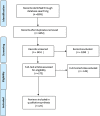Interventions to delay functional decline in people with dementia: a systematic review of systematic reviews
- PMID: 27121704
- PMCID: PMC4854009
- DOI: 10.1136/bmjopen-2015-010767
Interventions to delay functional decline in people with dementia: a systematic review of systematic reviews
Erratum in
-
Correction.BMJ Open. 2017 Jun 7;7(5):e010767corr1. doi: 10.1136/bmjopen-2015-010767corr1. BMJ Open. 2017. PMID: 28592586 Free PMC article. No abstract available.
Abstract
Objective: To summarise existing systematic reviews that assess the effects of non-pharmacological, pharmacological and alternative therapies on activities of daily living (ADL) function in people with dementia.
Design: Overview of systematic reviews.
Methods: A systematic search in the Cochrane Database of Systematic Reviews, DARE, Medline, EMBASE and PsycInfo in April 2015. Systematic reviews of randomised controlled trials conducted in people with Alzheimer's disease or dementia measuring the impact on ADL function were included. Methodological quality of the systematic reviews was independently assessed by two authors using the AMSTAR tool. The quality of evidence of the primary studies for each intervention was assessed using GRADE.
Results: A total of 23 systematic reviews were included in the overview. The quality of the reviews varied; however most (65%) scored 8/11 or more on the AMSTAR tool, indicating high quality. Interventions that were reported to be effective in minimising decline in ADL function were: exercise (6 studies, 289 participants, standardised mean difference (SMD) 0.68, 95% CI 0.08 to 1.27; GRADE: low), dyadic interventions (8 studies, 988 participants, SMD 0.37, 95% CI 0.05 to 0.69; GRADE: low) acetylcholinesterase inhibitors and memantine (12 studies, 4661 participants, donepezil 10 mg SMD 0.18, 95% CI 0.03 to 0.32; GRADE: moderate), selegiline (7 studies, 810 participants, SMD 0.27, 95% CI 0.13 to 0.41; GRADE: low), huperzine A (2 studies, 70 participants, SMD 1.48, 95% CI 0.95 to 2.02; GRADE: very low) and Ginkgo biloba (7 studies, 2530 participants, SMD 0.36, 95% CI 0.28 to 0.44; GRADE: very low).
Conclusions: Healthcare professionals should ensure that people with dementia are encouraged to exercise and that primary carers are trained and supported to provide safe and effective care for the person with dementia. Acetylcholinesterase inhibitors or memantine should be trialled unless contraindicated.
Trial registration number: CRD42015020179.
Keywords: PRIMARY CARE; REHABILITATION MEDICINE.
Published by the BMJ Publishing Group Limited. For permission to use (where not already granted under a licence) please go to http://www.bmj.com/company/products-services/rights-and-licensing/
Figures
References
-
- Prince M, Guerchet M, Prina M et al. . Policy briefs for heads of government: the global impact of dementia 2013–2050. London: Alzheimer's Disease International: 2013.
Publication types
MeSH terms
Substances
LinkOut - more resources
Full Text Sources
Other Literature Sources
Medical
Miscellaneous


